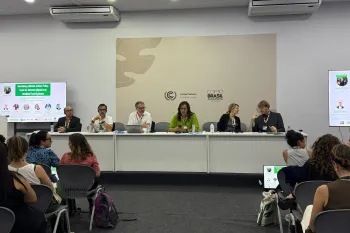BELEM, Brazil—Humane World for Animals cohosted a panel at the United Nations Climate Change Conference, COP30, to spotlight how public policies can accelerate the shift toward healthier, more sustainable and climate-resilient food systems. The session, titled “Nourishing Climate Action”, brought together government representatives, researchers and civil society for a practical and forward-looking discussion on integrating food systems into climate strategies.
Food systems are both a challenge and an opportunity. They account for nearly one-third of global emissions and drive deforestation, biodiversity loss and public health crises. Yet they also hold the key to climate resilience. The “Nourishing Climate Action” panel urged governments to integrate food systems measures into their National Adaptation Plans and Nationally Determined Contributions, emphasizing that meaningful climate progress depends on changing how food is produced and consumed. They further encouraged participants to consider how public institutions can lead by example, how innovation can support climate adaptation and how inclusive, evidence-based policy tools can align environmental, social and health objectives.
The discussion highlighted real-world examples from Brazil. Rodrigo José Abreu dos Santos, technical operations coordinator at the Rio de Janeiro Municipal Secretariat of Education, shared the city’s experience with its Sustainable Plate pilot project which introduces protein diversification and climate education in school meals at 15 municipal schools with expansion planned for 2027.
Santos said: “Schools are spaces for comprehensive development. When we offer healthier and more sustainable meals, we teach students to care for themselves and for the planet. Our experience shows that simple changes in food policies can deliver concrete results for the climate and for students’ health.”
Salvador’s secretary of sustainability, resilience, well-being and animal protection, Ivan Euler, presented the city’s Educating for Sustainability program, which promotes changes in school food policies and has already delivered impressive results: saving more than 16,000 hectares of land, conserving 258 million liters of blue water and avoiding more than 55,000 tons of CO₂e emissions.
Euler said: “Transforming these systems — especially diets — is central to meeting national commitments on climate and nature, particularly in contexts involving deforestation, food security, resilience, and health. We will only keep the Paris Agreement targets within reach if we urgently and effectively address global food systems.”
The panel also featured voices from Denmark and Minas Gerais, one of Brazil’s largest states, as well as from international organizations, offering practical measures to bridge food and climate policies, from sustainable public procurement to unlocking financing and driving innovation.
Thayana Oliveira, Brazil country director for Humane World for Animals, said: “This conversation gave policymakers and practitioners a roadmap for action, which supports sustainable food programs in the participating cities. At Humane World for Animals, together with Mercy for Animals, we are already putting these ideas into practice, working with five Brazilian municipalities to implement sustainable food policy programs. In addition to Rio and Salvador, cities like Caruaru, Sobral and Belo Horizonte are advancing initiatives that demonstrate how practical policy tools, combined with local leadership and civil society collaboration, can transform food systems while supporting people, animals and the planet.”
